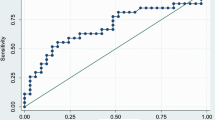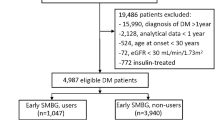Abstract
Self-monitoring of blood glucose (SBGM) is widely recommended for both type 1 and type 2 diabetic patients despite the lack of evidence of benefit in glucose control or as an aid in weight loss in type 2 subjects. This study tested the hypothesis that combined use of SMBG and dietary carbohydrate (CHO) counting, using the blood monitoring results to shape dietary CHO quotas, is beneficial in managing type 2 diabetes. Twenty-three over-weight (body mass index, BMI 27.5–44 kg/m2) patients aged 40–75 participated in a 28-week behavioral weight control program. Baseline hemoglobin HbA 1c ranged between 9.5% and 13.5% (normal range 5.5%–7.7%). Subjects were matched for weight, sex, and HbAlc and assigned to small (4–8 participants) groups which met weekly for 12 weeks and then monthly for 16 weeks. After 8 weeks, the group were randomized either to continue the behavioral program or to have SMBG and dietary CHO counting. Glucose monitoring was performed 6 times daily (pre- and 2h postprandially) for the first month, focusing on the meal increment and correlating this to dietary CHO intake. Weight loss was identical in both groups during the year of follow-up. The HbA1c level showed a progressive decline in experimental subjects (P<0.05), whereas there was no improvement in control subjects.
Similar content being viewed by others
References
Cohen M, Zimmet P, Self-monitoring of blood glucose levels in non-insulin-dependent diabetes mellitus. Med J Aust 2:377–380, 1983
Paulshock B, Johnson L, Monitoring techniques in non-insulin-dependent diabetes mellitus. Primary Care 15:389–408, 1988
Trovati M, Burzacca S, Mularoni E, Massucco P, Cavalot F, Matie L, Anfossi G, Occurrence of low blood glucose concentrations during the afternoon in type 2 (non-insulin-dependent) diabetic patients of oral hypoglycaemic agents: importance of blood glucose monitoring. Diabetologia 34:662–667, 1991
Wing R, Epstein L, Nowalk M, Scott N, Koeske R, Hagg S, Does self-monitoring of blood glucose levels improve dietary compliance for obese patients with type 2 diabetes? Am J Med 81:830–835, 1986
Wing R, Epstein L, Nowalk M, Scott N. Self-regulation in the treatment of type II diabetes. Behav Ther 19:11–23, 1988
Newman W, Laqua D, Engelbrecht D, Impact of glucose selfmonitoring on glycohemoglobin values in a veteran population. Arch Int Med 150:107–110, 1990
Allen B, DeLong E, Feussner J, Impact of glucose self monitoring on non-insulin treated patients with type 2 diabetes mellitus. Diabetes Care 13:1044–1050, 1990
American Diabetes Association, Consensus statement on selfmonitoring of blood glucose. Diabetes Care 10:95–99, 1987
Cheney C, Long term benefits of an intensive diabetes education program. Diabetes 38 [Suppl.]:171A, 1989
Muchmore D, Miller M, Making carbohydrates count. Diabetes Forecast:25–30, 1989
Brackenridge B, Carbohydrate gram counting. Pract Diabetol (June):22–28, 1992
American Diabetes Association, Nutritional recommendations and principles for individuals with diabetes mellitus. Diabetes Care 10:126–132, 1987
American Diabetes Association, National standards for patient education and American Diabetes Association review criteria. Diabetes Care 9:36–40, 1986
DCCT Research Group, Reliability and validity of a diabetes quality-of-life measure for the diabetes control and compliciations trial (DCCT). Diabetes Care 11:725–732, 1988
Hamman R, Genetic and environmental determinants of noninsulin-dependent diabetes mellitus (NIDDM). Diabetes/Metab Rev 8:287–338, 1992
Garg A, Bantle J, Henry R, Coulston A, Griver K, Raatz S, Brinkley L, Chen I, Grundy S, Huet B, Reaven G, Effects of varying carbohydrate content of diet in patients with non-insulin dependent diabetes mellitus. JAMA 271:1421–1428, 1994
Author information
Authors and Affiliations
Rights and permissions
About this article
Cite this article
Muchmore, D.B., Springer, J. & Miller, M. Self-monitoring of blood glucose in overweight type 2 diabetic patients. Acta Diabetol 31, 215–219 (1994). https://doi.org/10.1007/BF00571954
Received:
Accepted:
Issue Date:
DOI: https://doi.org/10.1007/BF00571954




